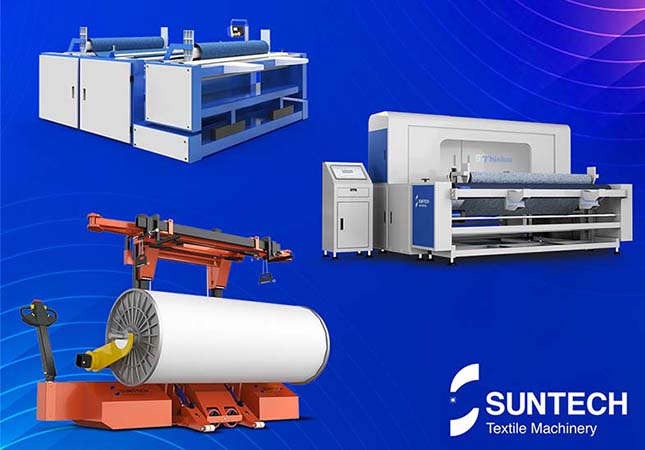Smart manufacturing in the textile industry refers to the integration of advanced technologies and data-driven processes to enhance efficiency, productivity, and sustainability in textile manufacturing. It involves the use of automation, robotics, artificial intelligence (AI), Internet of Things (IoT), data analytics, and other digital technologies to optimize various aspects of textile production.

Key Aspects of Textile Smart Manufacturing
1. Automation: Smart manufacturing employs automated systems and robotics to streamline various processes in textile manufacturing, such as material handling, cutting, sewing, and packaging. These technologies can improve production speed, accuracy, and consistency while reducing labor requirements and costs.
SUNTECH Textile Machinery Automation
SUNTECH Textile Machinery has transformed the manufacturing landscape through the introduction of cutting-edge technologies like ST-Thinkor and AGV, revolutionizing automation in the industry. Among these innovations, SUNTECH's AGV technology has made a significant impact on material handling, a crucial aspect of textile production. The ST-FL, a forklift-shaped automated guided vehicle, stands out for its enhanced efficiency and cost-effectiveness compared to traditional AGV types. Its tailored design makes it particularly well-suited for the unique needs of the textile industry.
SUNTECH Textile Machinery remains committed to continuous innovation and product upgrades to meet the evolving requirements of the textile industry. Looking ahead, the next 2-3 years present a historic opportunity for the textile industry to embrace and accelerate the application and development of artificial intelligence (AI) technology. AI is poised to become a strategic driver of the industry's future, elevating intelligence levels across various textile domains and bringing about profound changes. Its impact cannot be overstated.
In this era of advancement, it is crucial to fully grasp the distinctive features of AI technology and closely align them with the specific demands of textile enterprises. By effectively combining these technologies with industry needs, the promotion process can unlock unparalleled opportunities for growth and efficiency in the textile sector. SUNTECH Textile Machinery stands ready to lead the way in this transformative journey, empowering textile manufacturers to thrive in an increasingly intelligent and dynamic landscape.
2. Internet of Things (IoT): IoT sensors and devices are utilized to collect real-time data from machines, equipment, and processes. This data can be used to monitor machine performance, identify maintenance needs, track inventory levels, and optimize production schedules. IoT also enables the integration of different components within the manufacturing ecosystem for seamless data exchange and decision-making.
3. Artificial Intelligence (AI): AI technologies, including machine learning and computer vision, can be applied in smart textile manufacturing. AI algorithms can analyze large volumes of data to identify patterns, predict maintenance needs, optimize production parameters, and detect quality issues. AI-powered systems can also enable predictive maintenance and minimize downtime by identifying potential machine failures before they occur.
ST-Thinkor, also known as the SUNTECH AI Automated Visual Inspection System, has garnered widespread adoption across a diverse range of industries, including fabric production, garment manufacturing, home textile production, electronic and industrial glass fiber production, automotive interior and airbag manufacturing, and non-woven fabric production, among others.
4. Data Analytics and Predictive Modeling: By collecting and analyzing data from various sources, such as production processes, supply chain, and customer feedback, textile manufacturers can gain valuable insights to improve operational efficiency and product quality. Predictive modeling techniques can help forecast demand, optimize inventory levels, and anticipate production bottlenecks.
5. Sustainable Manufacturing Practices: Smart manufacturing can contribute to sustainability efforts in the textile industry. By optimizing resource utilization, reducing waste, and minimizing energy consumption, textile manufacturers can improve their environmental footprint. Data-driven insights can help identify areas for improvement and enable the adoption of sustainable practices throughout the supply chain.
6. Supply Chain Integration: Smart manufacturing in textiles involves the integration of different stakeholders within the supply chain, including suppliers, manufacturers, distributors, and retailers. Through real-time data sharing and collaboration, the entire supply chain can be optimized for improved efficiency, inventory management, and responsiveness to customer demands.
Smart manufacturing in the textile industry offers significant opportunities for increased productivity, quality control, sustainability, and cost savings. By leveraging advanced technologies and data-driven insights, textile manufacturers can adapt to changing market dynamics, enhance competitiveness, and meet the evolving demands of customers in a rapidly changing industry.




